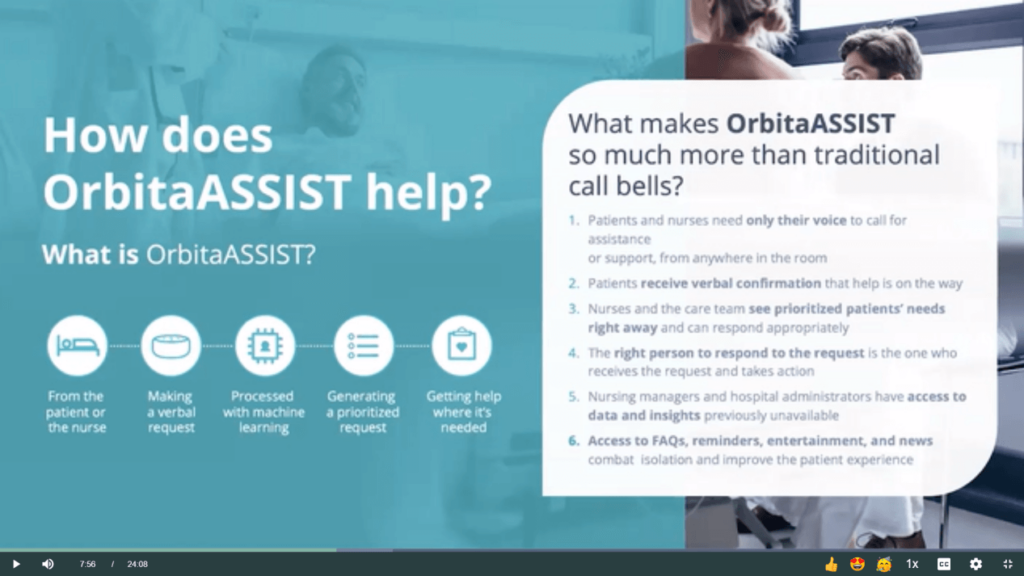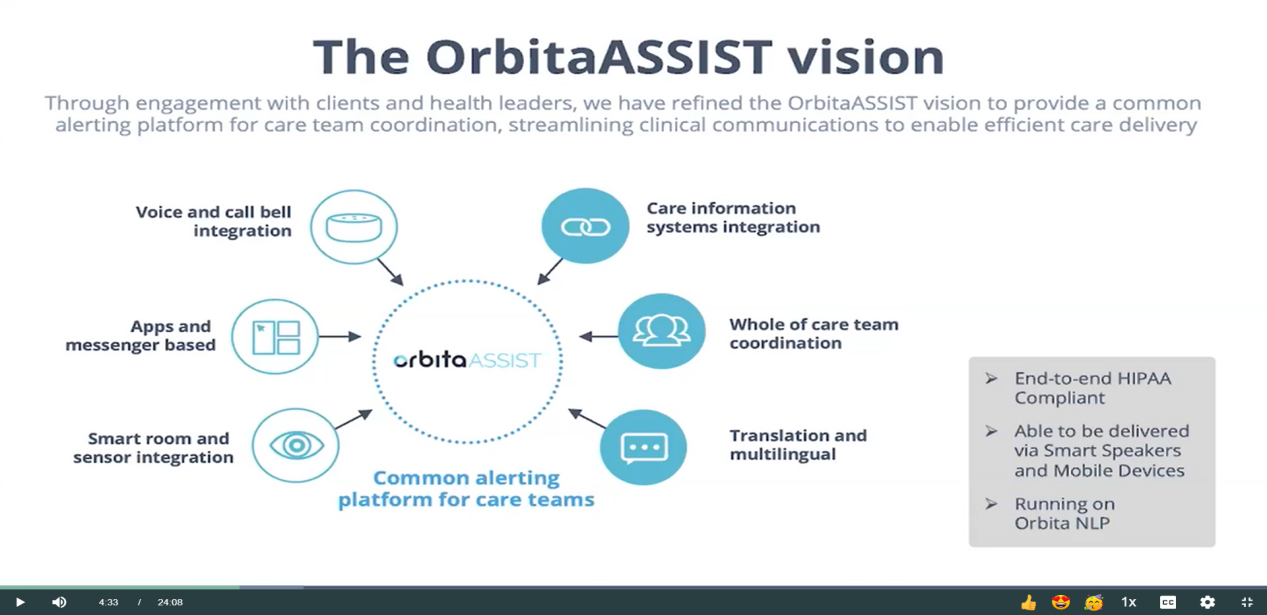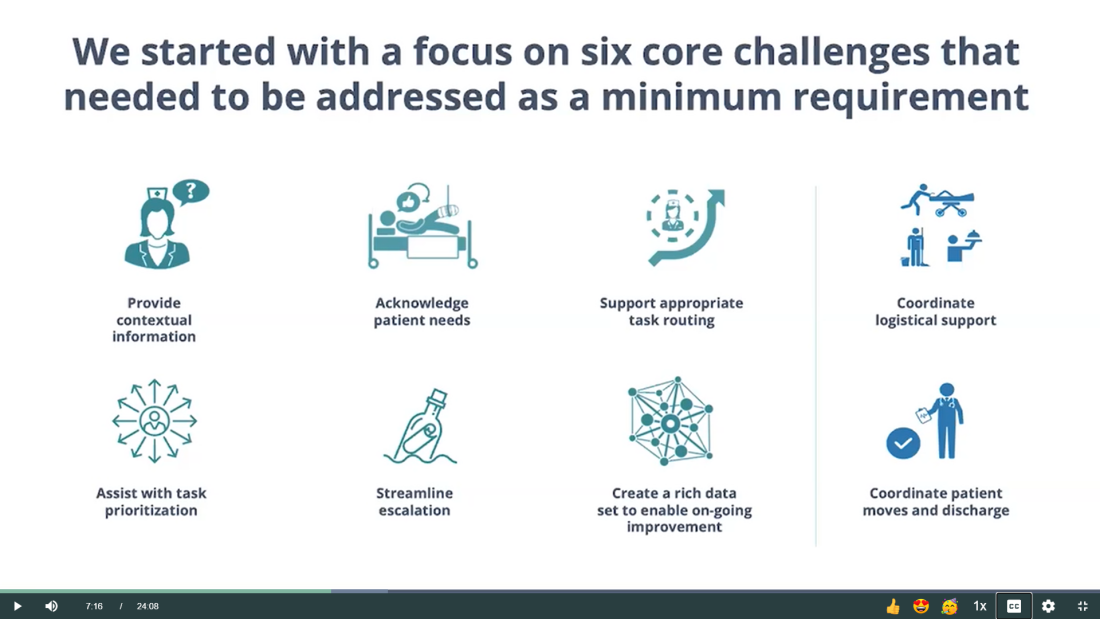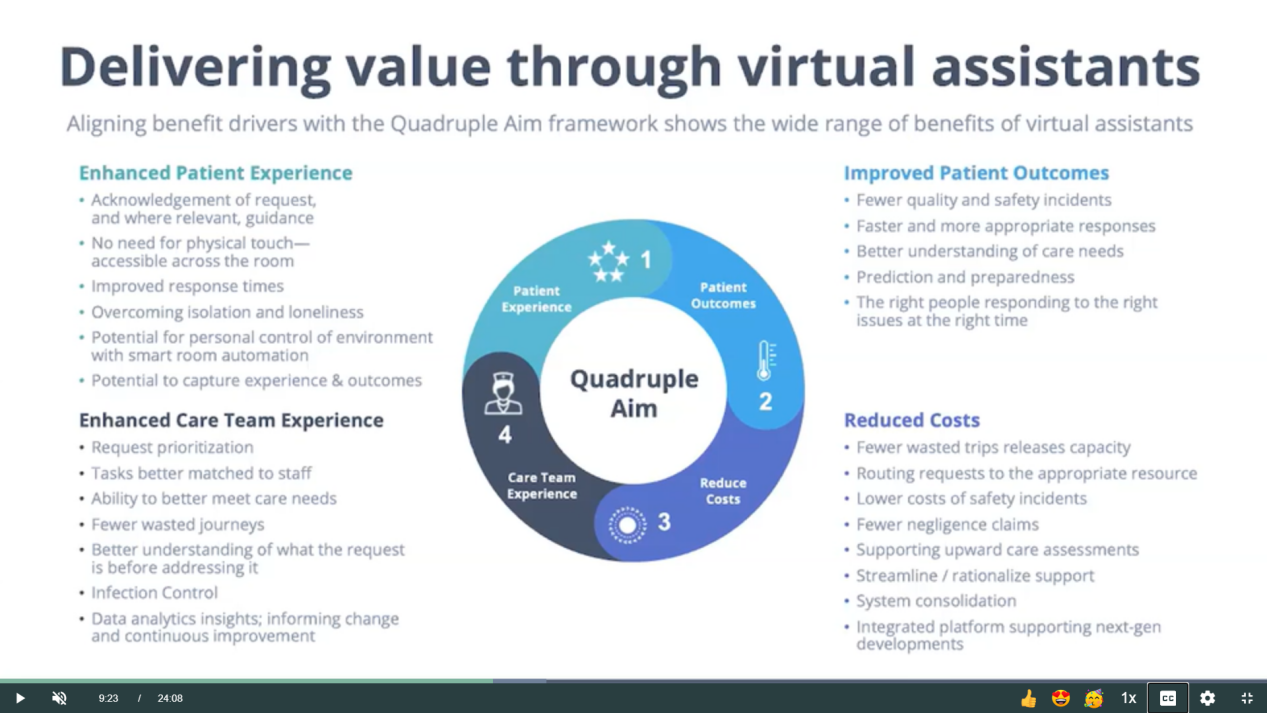
Orbita Assist- Conversational AI transforming the lives of patients and health care
Orbita powered virtual health care assistants target the gaps in patient engagements. It’s a solution to help users build conversational interactions and to publish those out to a combination of webchat, capability or chatbots or mobile apps, SMS interactions, or smart speakers. We can even publish them out to phone conversations or IBRs. On top of that, there are three vertical solutions built.
Orbita Engage – A virtual concierge for the healthcare digital front door. Reach and engage consumers give access to healthcare information and services through technology they use every day
Orbita Assist – A virtual bedside assist empowering hand-free, patient-provider communication. AI-powered request prioritization and smart routing requests the right resource to meet the patient’s needs. It can be used by a patient as well as a health care worker who is using other services to monitor.
Orbita Connect – A virtual assistant providing pre and post visit continuity for patients at home. Ensuring they are prepared, informed, and empowered through personalized patient education, guidance, and support.
This blog talks more about the solution Orbita Assist: The inception of Assist solution started when one of the employees of Orbita lost his father while recovering from a routine surgery, when he actually needed someone to assist him to go to the bathroom but since no one was available so he went by himself and fell down, unfortunately, he passed away and that began the journey of the technology where they started to have a look at the technology that was supporting the care team and whether that technology could be improved, whether we could support the nurses and the care teams more with technology to be able to deliver that care for patients.
Orbita Assist Vision – Through engagement with clients and health leaders, Team has refined the Orbita Assist vision to provide a common alerting platform for care team coordination, streamlining clinical communications to enable efficient care delivery.
After engaging some of the local hospitals, Orbita started working with nurses who identified a number of challenges that they wanted us to focus on, which were:
- Provide Contextual Information – The patient should be able to raise a request when in need. A proper means for communication should be assigned.
- Acknowledge patients – To respond to patients after receiving their requests.
- Support appropriate task routing – It’s not necessary that every task should directly come to nurses, some can be redirected to experts who have better resources.
- Assist with task prioritization – In a situation where multiple requests are being raised there a priority should be given to emergency cases.
- Streamline Escalation – In case a patient has not received any response then, an escalation should be made address him/her quickly
- Enable ongoing improvement – The knowledge management should be strong enough to never stop the improvement process.
What makes Orbita Assist so much more than traditional call bells ?
- Patients and nurses need only their voice to call for assistance or support from anywhere in the room.
- Patients receive verbal confirmation that help is on the way.
- Nurses and the care team prioritize patients’ needs right away and can respond appropriately.
- The right person to respond to the request is the one who receives the request and takes action.
- Nursing managers and hospital administrators have access to data and insights previously unavailable.
- Access to FAQs, reminders, entertainment, and news combat isolation and improve the patient experience.

This enables the care team to have all the information beforehand and respond both in terms of speed and nature of response, which has dramatically improved. Knowing that they are about to walk into a room where somebody has fallen or where somebody is not feeling well, or potentially somebody who’s in pain and asking for medication, they’re able to equip themselves better before they walk into the room. Nurses, just as a statistic for you, walk about 4.5 miles to 6 miles a day. They spend about 100 minutes of their shift walking. And anything we can do to reduce the number of trips that they need to do that are essentially not valuable trips, information gathering trips, if we can provide that information to them ahead of them needing to visit the patient’s room. It enriches their ability to meet the patient’s requests and the amount of time that it’s taking to actually work with those patients.
While building the solution, The main focus was not just the benefits that are listed for the patients. Orbita was also acutely thinking about the benefits for the care team and how the care team engaged through this interaction. But also from a hospital perspective, how does this solution actually help the hospital system to provide care. If we talk about patients then the voice-activated request is improving response time, since there is no need for physical contact so it becomes easier for patients when they are undergoing any critical or emergency situation. It is also helping patients to get connected to their communities and helping them to fight loneliness in isolation.
For the care team, it helps them prioritize, just understanding what’s important and what’s not. Secondly, contextual information that is really rich information around what I am about to walk into? The smart routing is also another benefit where rather than having a broadcast alarm that’s going off at a hospital unit, Team aims to direct the request directly to the most appropriate individual to respond to the care and to the individual’s needs. So all of that results in fewer wasted journeys and the ability for us to free time for care workers to be able to focus on that patient care.
The Orbita Assist is creating a sense of care for which is in turn reducing incidents of unpreparedness and the right people are responding to the right issues at the right time.
All of those three things are adding up to reducing costs. So the fewer wasted trips are releasing capacity, the ability for us to combat hospital-acquired complications, and the costs associated with those.
During present times where COVID 19 is affecting the health administration of various hospitals, a voice channel is a key way that is used to combat the need for avoiding physical touch and get access to information and services that previously we needed to interact with a system of some sort using touch. Especially during isolation, we are helping patients to overcome loneliness which is a key part of how we can support our patients. This is also helping in protecting our health workers in these environments. The importance of health workers is very critical at this point in time.
So they are just some of the ways that we have been responding to COVID 19. In terms of the solution Assist, that is introduced in the market, the impacts and the benefits we have been seeing, and how those map against a quadruple aim solution. The team at Orbita have been working with the ServiceNow team to bring this solution to the market and it has been fantastic in terms of taking advantage of some of the leading elements of the ServiceNow platform, and supporting the health care workers.



